The seaside town where there are not enough homes to go around – and the rental market is broken
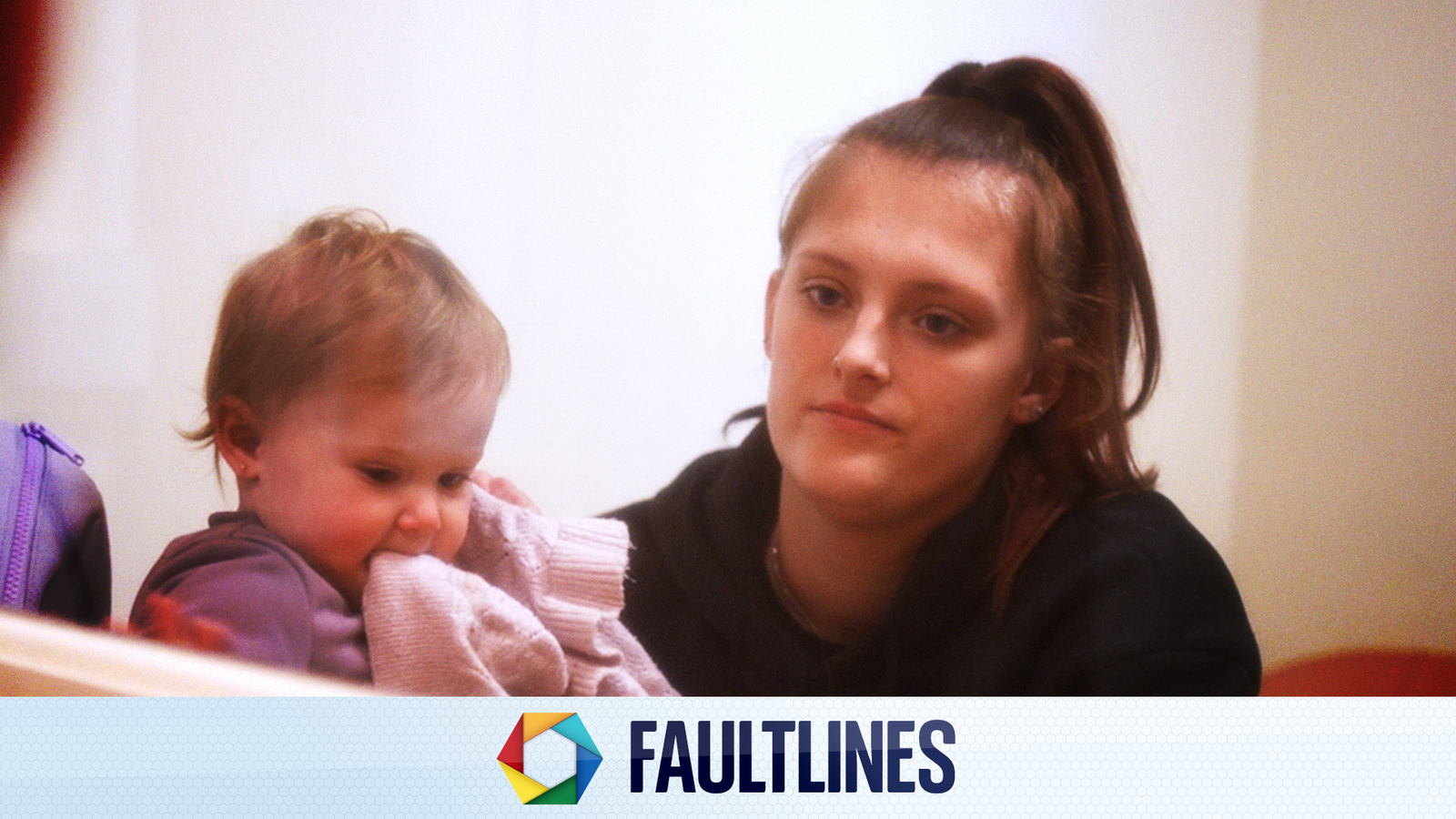

It’s early on a Monday morning and the sliding doors to the office of Hastings Council haven’t stopped moving backwards and forwards. This is where the homeless come in desperation.
Eunice Dolby is sitting in the waiting area surrounded by suitcases containing all of her possessions.
The 77-year-old lost her husband last year and now she’s lost her home.
After 18 years as a tenant, her landlord used a Section 21 “no-fault” eviction notice to get her out.
“The bailiffs turned up at quarter past 10,” she says.
“I’ve always had somewhere to live. I’ve never been on the streets in my life.”
As she’s describing what happened, her head lowers and she catches her breath.
“I kept it clean and tidy, I’ve left it spotless. I never thought I’d be homeless.”
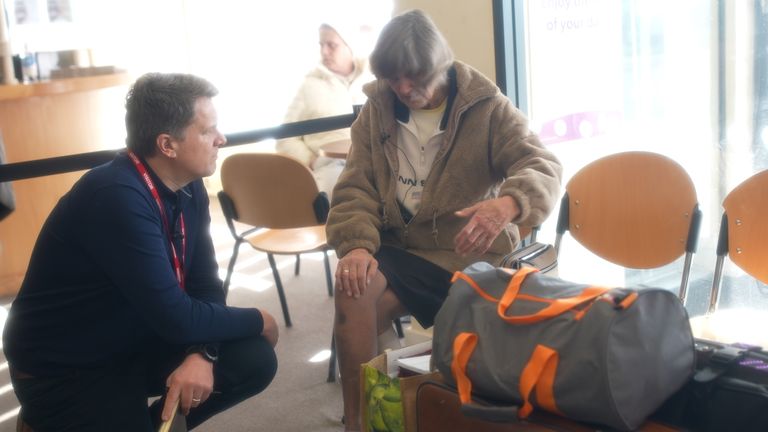
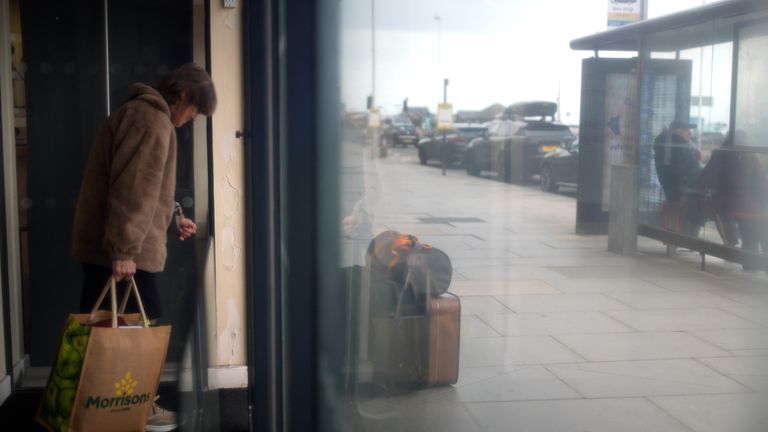
A few minutes later, 18-year-old Leah Gartside comes through the door with her 14-month-old baby Livia in a buggy. They’ve been living with her parents who’ve also got a Section 21 notice – the landlord wants to sell up.
Advertisement
“We’ve been good tenants, there’ve been no complaints. We love living there, we’ve been there for 16 years,” she says.
Leah’s come to get help before things get worse and the bailiffs are on the doorstep.


I’m told that this is a typical Monday morning for the on-duty housing officers. I’m here to spend some time with them, to understand why Britain is gripped by a housing crisis that is causing misery for thousands of people.
And local councils are bearing the brunt because they have a legal duty to put a roof over the heads of homeless people eligible for help.

“I would say the one biggest stress in life is losing your home and not knowing where you’re going to sleep from one night to the next,” says the duty officer, Phil Veness.
He has pages and pages of appointments booked on his screen, plus they handle emergencies like Eunice.
Leah is working but she cannot afford to rent from a private landlord in Hastings.
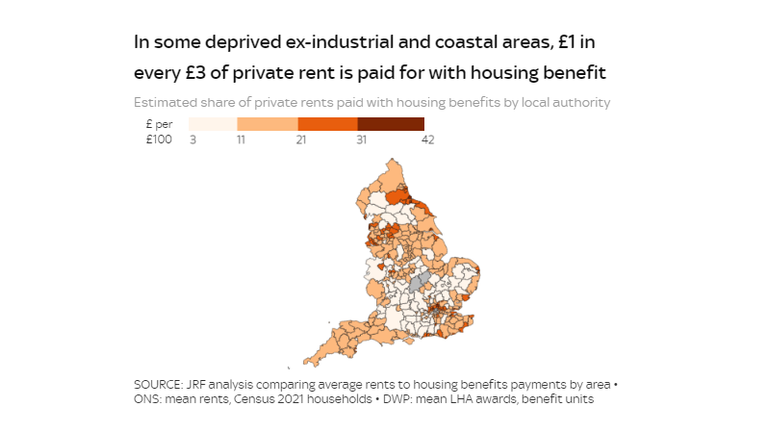
Winner and losers
The seaside town has boomed in the last few years with an increasing number of boutiques, restaurants and bars. Hybrid working after COVID means more people can live by the coast and commute into London.
House prices have seen the biggest relative rise than anywhere else in England over the last decade. Tourism is worth £288m a year.
And there are now around 1,000 Airbnb properties to rent. Passing estate agent windows, you can see the high price for small flats up for rent, often over £1,000 a month.
But popularity has a price. There are not enough homes to go around.
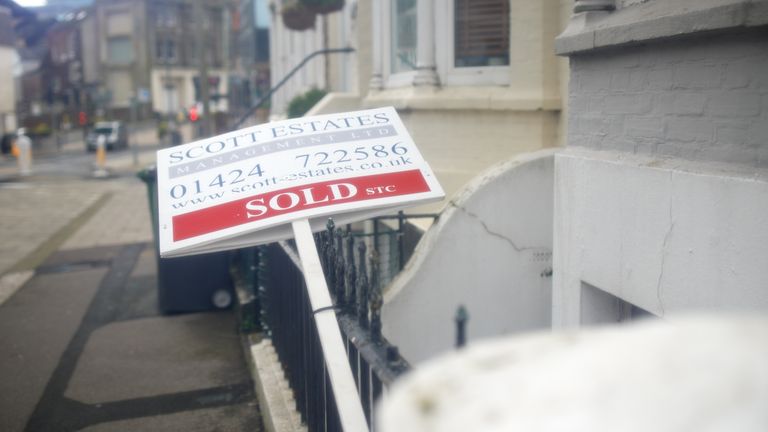
As in many coastal towns, the rental market is broken. Homes that are available cost a lot of money. New analysis by the Joseph Rowntree Foundation (JRF) shows that housing benefit was paying a quarter of all private rents in Hastings.
The housing benefit bill here is £28m a year and 22% of those properties are substandard.
In England, landlords who rent out homes which are below the decent homes standard receive £1.6bn in house benefits per year, (equivalent to £1 in every £5 spent on housing benefit in the private rented sector).
In other words, according to the JRF, benefits are subsidising poor quality homes.
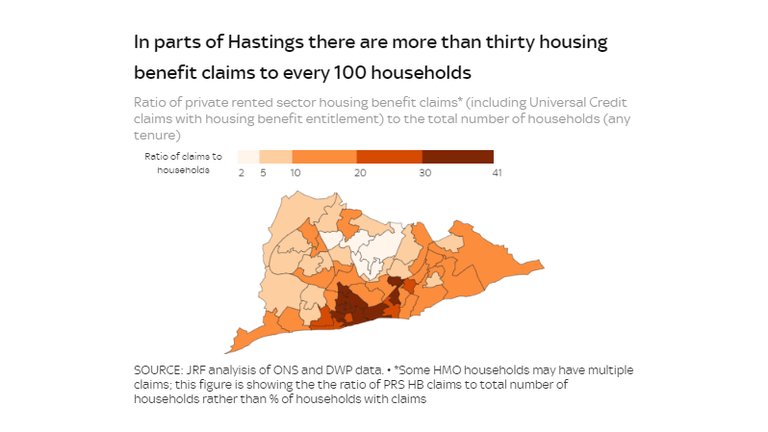
Darren Baxter, principal policy adviser at JRF, says: “Taxpayers and local councils shouldn’t be footing the bill for poor-quality properties owned by private landlords.
“We need to get this dysfunctional system working again. Strategically bringing private homes back into social ownership is a rapid way to fix this crisis.”
But it’s still not enough. Housing benefit is calculated to reflect the local private rental market – the amount given from central government has been frozen since 2020 and will only go up from next month. It has not kept pace with rents.
This means that in Hastings, like many other parts of the country, there is a gap between the amount of benefit paid and rents charged.
I was told that some landlords have been known to evict their tenants, make their property available for temporary accommodation at a higher rate only then to house tenants who have been made homeless in the first place.
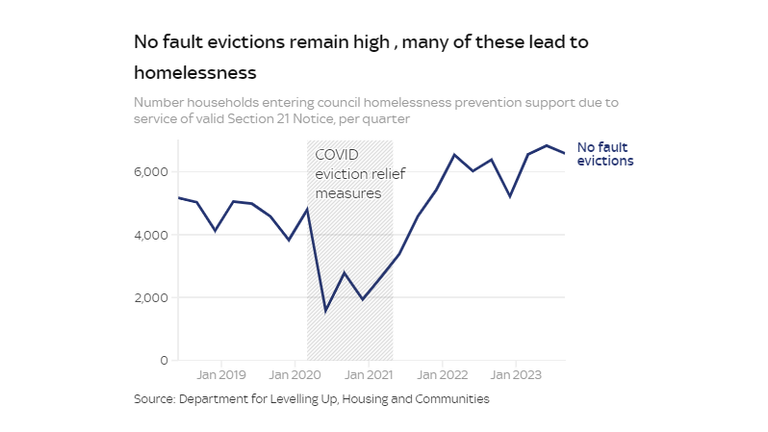
‘I worry about the kids’
Chelsea Braiden is surrounded by bags and boxes again. Last year she and her two sons Harley, aged seven, and Jesse, six, were evicted from the flat they were renting because the landlord wanted the property back. And now they are packing up again.
“I’m stressed because I worry about the kids. That we’re not going to have the right suitable home before things get hard,” Chelsea says.
The stakes are high for Chelsea and she really needs a suitable home to live in because both of her boys are very ill.

Harley and Jesse have Duchenne Muscular Dystrophy, a severe muscle-wasting disease that gets worse over time. They will both need wheelchairs and help breathing. There is no cure. It’s likely they won’t live beyond the age of 30.
“I think it’s going to be difficult to find that suitable property that is big enough for both of these kids to live in. It’s not going to be just for now. It’s got to be until they pass away.”

They are living in a tiny bungalow on the edge of town. The doors aren’t wide enough for wheelchairs.
“You just worry that you’re not going to give them the best life that they should have. You see other children that age and they have decent homes, where they can be kids. My kids can’t just be kids, that’s what’s so difficult.
“And while they’re still walking, I want to give them what they need as kids.”
Read more:
Families housed in single rooms beyond legal time limit
The horror of living in a damp ridden home
The housing battle – which party will get Britain building?
National picture is bleak
There are 500 households living in temporary accommodation in Hastings and it’s costing the council a fortune. In 2019, the council spent £730,000 on temporary accommodation.
Within the next year, the council estimates that bill will rise to £5.6m. This is a third of the total budget for the whole town – pushing the council to the brink of bankruptcy.
Nationally, the picture is also bleak. Analysis by the Local Government Association shows that the number of households living in temporary accommodation is the highest since records began in 1998, costing councils at least £1.74bn in 2022/23.
But there are glimmers of hope. After packing up, Chelsea’s taking her sons to see their new house for the first time. It’s a bright modern property with a downstairs bathroom and easier access for the boys.
Their housing officer, Vanessa Stock, has relocated four households to make the move possible. But it is still temporary.

Chelsea says she has looked for private rentals but cannot afford it. She works part-time around school hours, but it’s not enough.
Like thousands of others, she is priced out of the market.
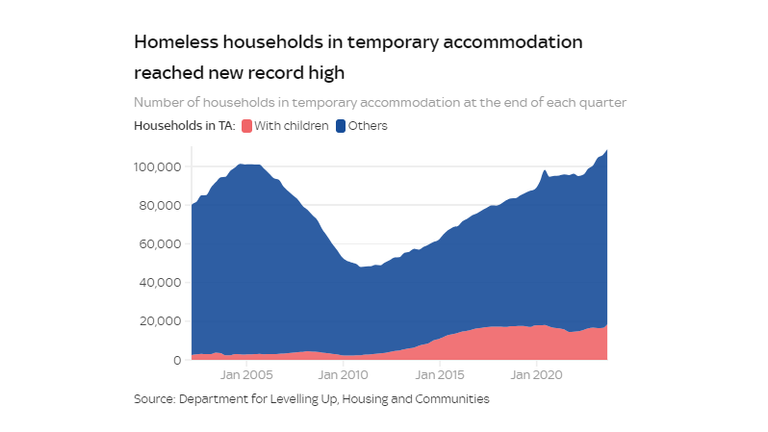
Waiting game
There are more than a million people in England waiting for something more permanent – affordable social housing. The rent for social housing is linked to local wages so cheaper than a private landlord. Tenancies are also more secure.
Housing manager Alan Sheppard shows what he calls the “housing register”. It is effectively the waiting list for a house.
On this day there are just six available properties for 1,500 households.
“So as you can see, the supply is nowhere meeting the demand,” Alan says.

‘I don’t get anywhere’
On the other side of town is a former nursing home that has been converted into bedsits.
In the communal hallway some pushchairs are parked up. Most of the bedsits are for homeless mums and their children. Like 20-year-old Jessica, who lives in a small room with her two-year-old son Leo. This is the only home he has ever known.
Jessica is used to this. She has been stuck in temporary housing for five years since she was 15. She knows the housing register system well. She is one of the 1,500 households clicking and hoping, week after week.
“When I became homeless, we went to about five estate agents in town. Everywhere we walked into turned us down.
“I wake up and wait. I wonder if I am going to get a house today. I bid and get nowhere. I get excited thinking maybe I am going to get lucky. But I don’t get anywhere.”
And she’s worried about her son, Leo.
Please use Chrome browser for a more accessible video player

0:58
Two-year-old grows up living in one room
“He’s so used to being in a trapped room that the outside world for him is hard to deal with,” says Jessica.
“Even just going for a walk or going out to a playgroup is strange for him.”
And as each day passes, the council must pay for the accommodation.
Buying back
One solution is to roll back the clock.
In the 1980s, millions of council houses were sold to tenants under the Right to Buy scheme. Now many councils are buying back the homes they once owned to cope with the crisis.
This has been possible with the help of government money. The £1.2bn Local Authority Housing Fund has been split between 203 councils – partly to house Ukranian and Afghan refugees, but also help others in poor quality, expensive temporary accommodation.
Hastings Council has used this, alongside the Move on Fund to fund the purchase of 50 houses along with their own budget.
“Needs must,” says Chris Hancock, director of housing at Hastings Borough Council.

He shows one of the three-bed, ex-council houses with a garden that was bought back from the open market last year.
“We can either keep going, spending £500 a week on temporary accommodation, which just isn’t good enough, or bite the bullet and start building up our portfolio again…
“We can’t afford for people to be in emergency accommodation. We don’t want people living in one room in bed and breakfasts. We want people to be in a home.”
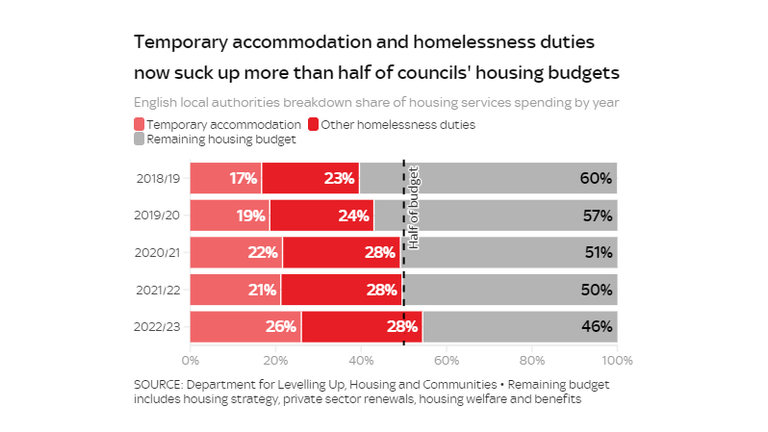
The government says it’s committed to delivering 300,000 homes a year, including spending £11.5bn on affordable homes.
In 2021/22, just 7,528 new social homes were delivered. Nowhere near enough for the 1.1 million people on the waiting list.
Empty houses
A block of flats in a pretty, leafy part of Hastings lies empty. It is owned by Orbit, a local housing association.
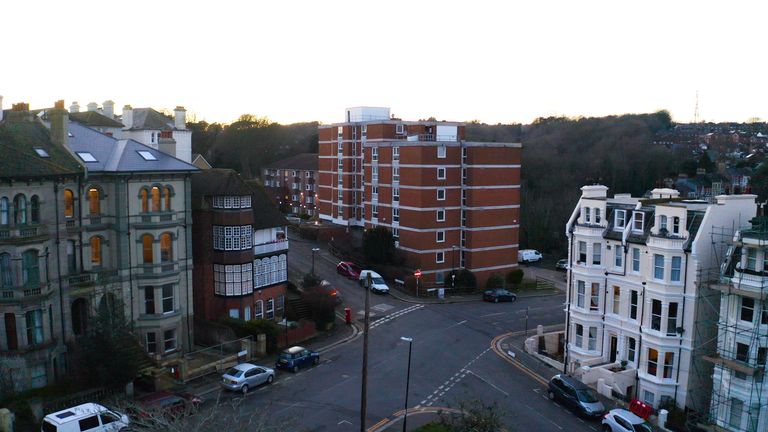
Local campaigner Grace Lally is using colourful chalk spray to emblazon walls with slogans questioning why this block is empty.
She says Orbit is deliberately neglecting social housing stock so that it can be sold privately for profit.
“Last summer the people living here were moved out – the housing association said the flats didn’t meet modern thermal efficiency standards. Most of the houses in Hastings are probably not up to modern thermal efficiency standards,” she said.
“It’s just another drain of social housing out of the system. [There are] 53 flats that could be going to people who are on the waiting list. This is a scam. This is not okay.”
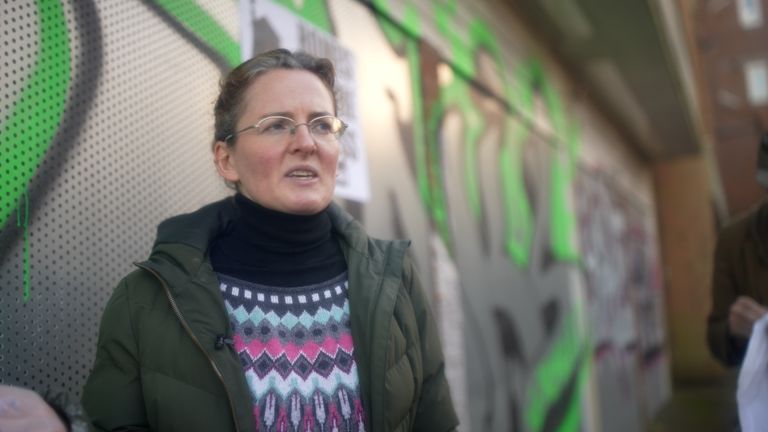
A spokesperson for Orbit said: “Orbit is a not-for-profit housing association. We will therefore aim to provide as much affordable housing on the site as planning and environmental decisions allow.
“We took the decision to decommission Clifton Court with plans to redevelop the scheme into new affordable homes given the existing building could no longer meet customers’ needs… We cannot confirm what proportion of the new development will be earmarked for social housing as this will form part of the planning process.”
The mainstream political parties agree on the need for more homes to be built.
The government says it’s “on track” to meet its manifesto commitment of building one million more homes before the end of this parliament and defended the use of temporary accommodation.
A spokesperson for the Department for Levelling Up, Housing and Communities said: “Temporary accommodation is a vital safety net to make sure families are not left without a roof over their heads. Figures show that the majority of families who have been in temporary accommodation for long periods of time are living in council-owned properties or private rented sector homes rented by the local authority. This provides a suitable home whilst families wait for settled accommodation, and councils have a responsibility to help families find this as quickly as possible.
“That’s why we are giving them £1.2bn over three years through the Homelessness Prevention Grant, and our £11.5bn Affordable Homes Programme will go further to deliver thousands more affordable homes to rent and buy across the country.”

Angela Rayner, Labour’s deputy leader and shadow housing secretary is making big promises ahead of the election.
“After 14 years of failure, the Conservatives have utterly failed to deliver the safe, secure and affordable homes Britain needs,” she said.
“Labour will put an end to the Tories’ housing emergency by ending the scourge of no-fault evictions, getting Britain building again with 1.5 million new homes, and delivering the biggest boost to affordable, social and council housing for a generation.”
No quick fix
Back at the front desk, Phil has nearly completed his meeting with Leah, the single mum we met at the council offices in the morning.
She is just the latest in a long line of people who need a home.
Phil says: “For a one-person property the average waiting time in Hastings is four years.
“For a two-bedroom place, it’s five years. And for a three-bedroom, it’s six years.”
Leah shakes her head. Her journey into the unknown is just beginning.
This is the first special report in Faultlines, a Sky News series that aims to explore some of the biggest issues facing Britain in an election year.
You can watch Nick Martin’s full report today at 10.30am, 12.30pm, 2.30pm and 6.30pm on Sky News, in the video above or on YouTube.